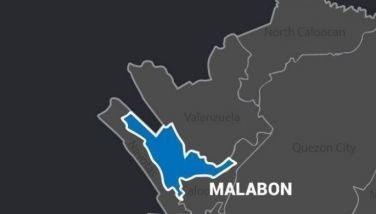Mactan Channel heavily polluted, says research group
October 17, 2002 | 12:00am
CEBU — The Mactan Channel has become so polluted that eating marine life caught from its waters can cause illnesses in humans and may even contribute to long-term diseases like cancer.
The pollution prompted researchers to raise the red flag over the 12-kilometer-long waterway separating Cebu and Mactan islands and whose waters directly touch at least seven towns and cities from Liloan in the north to Talisay City in the south.
While doing test and monitoring at the channel for an environmental profile, researchers found, through water sampling, that chemicals present in the channel have exceeded acceptable levels.
"The chemicals are small particles in the water and these cause the discoloration of the water. When fish and other marine animals eat and absorb these chemicals in their bodies, these make them sick. But not all the fishes die. Some just cease to function properly," said Becky Koeller, project coordinator of the Mactan Channel Multisectoral Management Council, a non-government research group.
Koeller said this phenomenon would contribute to the decrease in the channel’s marine life that the public can consume.
When humans consume surviving marine products harvested from the channel, they can have diarrhea, nausea and headaches. This can even contribute to long-term diseases like cancer, Koeller said.
The water tests undertaken by the group showed the presence of heavy toxic metals like chromium, lead, cadmium, nickel and zinc in levels above safe standards.
It was not clear how prolonged immersion in the polluted waters can be harmful to humans.
Koeller also cautioned that the lack of similar studies with which to compare their findings makes such findings not yet conclusive.
"We don’t know yet if the pattern of results we have gathered is normal or abnormal to the coastal environment of Mactan or whether the results are just the reflection of the mass quantity of samples we gathered because there has been no similar study done in the past to compare our findings with," she said.
The channel is the gateway to the port of Cebu, the hub of shipping south of Manila. Through it pass dozens of ships daily. Into it also flow waste and refuse from almost the entire metropolitan area of Cebu, the commercial and industrial center of the Visayas.
The channel also receives all kinds of water discharges carried by rivers and creeks within Metro Cebu, including the Mananga River in Talisay City, the Busay, Batuan, Guadalupe and Mahiga rivers in Cebu City, the Butuanon River in Mandaue City, and the Cansaga River in Consolacion.
The Butuanon and Cansaga empty into Cansaga and Magellan bays at the northern mouth of the channel.
The Mactan Channel Multisectoral Management Council is creating a baseline database that the community can use later for further studies.
A project of the Ramon Aboitiz Foundation, the database is being put up to promote awareness among communities in the area which can share the responsibility of protecting the channel. — Freeman News Service
The pollution prompted researchers to raise the red flag over the 12-kilometer-long waterway separating Cebu and Mactan islands and whose waters directly touch at least seven towns and cities from Liloan in the north to Talisay City in the south.
While doing test and monitoring at the channel for an environmental profile, researchers found, through water sampling, that chemicals present in the channel have exceeded acceptable levels.
"The chemicals are small particles in the water and these cause the discoloration of the water. When fish and other marine animals eat and absorb these chemicals in their bodies, these make them sick. But not all the fishes die. Some just cease to function properly," said Becky Koeller, project coordinator of the Mactan Channel Multisectoral Management Council, a non-government research group.
Koeller said this phenomenon would contribute to the decrease in the channel’s marine life that the public can consume.
When humans consume surviving marine products harvested from the channel, they can have diarrhea, nausea and headaches. This can even contribute to long-term diseases like cancer, Koeller said.
The water tests undertaken by the group showed the presence of heavy toxic metals like chromium, lead, cadmium, nickel and zinc in levels above safe standards.
It was not clear how prolonged immersion in the polluted waters can be harmful to humans.
Koeller also cautioned that the lack of similar studies with which to compare their findings makes such findings not yet conclusive.
"We don’t know yet if the pattern of results we have gathered is normal or abnormal to the coastal environment of Mactan or whether the results are just the reflection of the mass quantity of samples we gathered because there has been no similar study done in the past to compare our findings with," she said.
The channel is the gateway to the port of Cebu, the hub of shipping south of Manila. Through it pass dozens of ships daily. Into it also flow waste and refuse from almost the entire metropolitan area of Cebu, the commercial and industrial center of the Visayas.
The channel also receives all kinds of water discharges carried by rivers and creeks within Metro Cebu, including the Mananga River in Talisay City, the Busay, Batuan, Guadalupe and Mahiga rivers in Cebu City, the Butuanon River in Mandaue City, and the Cansaga River in Consolacion.
The Butuanon and Cansaga empty into Cansaga and Magellan bays at the northern mouth of the channel.
The Mactan Channel Multisectoral Management Council is creating a baseline database that the community can use later for further studies.
A project of the Ramon Aboitiz Foundation, the database is being put up to promote awareness among communities in the area which can share the responsibility of protecting the channel. — Freeman News Service
BrandSpace Articles
<
>
- Latest
- Trending
Trending
Latest
Trending
Latest
Recommended































